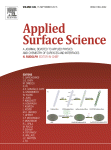 Applied Surface Science has retracted an article that looks at the structure of thin tungsten-titanium coating, because it was submitted without all of the co-authors’ consent.
Applied Surface Science has retracted an article that looks at the structure of thin tungsten-titanium coating, because it was submitted without all of the co-authors’ consent.
According to the introduction of the paper, “Structure adhesion and corrosion resistance study of tungsten bisulfide doped with titanium deposited by DC magnetron co-sputtering,” such thin films are “widely used as a surface treatment for optimizing base material properties.”
Here’s the retraction note in full, published in the September issue of the journal:
This article has been retracted: please see Elsevier Policy on Article Withdrawal (http://www.elsevier.com/locate/withdrawalpolicy).
This article has been retracted at the request of the Editor-in-Chief, because this paper had been written and submitted to the journal by the corresponding author, without the consent of (some of) the co-authors.
One of the conditions of submission of a paper for publication is that all authors have approved the manuscript and have agreed to submission to a journal. Since this condition has been violated, this paper will be retracted.
The paper has not been cited, according to Thomson Scientific’s Web of Knowledge.
We contacted the corresponding author on the paper, Elisabeth Restrepo Parra, a physicist at the National University of Colombia. We will update this post if we hear back.
In 2013, the Editor in Chief of the journal, Henrik Rudolph, commented on academic misconduct, including authorship issues, in Elsevier’s Editor’s Update:
Often people are included as authors when they have contributed only marginally, if at all. This might sound like a rather innocent kind of altruism, but it is highly misleading for the reader and very irritating for an editor. Even worse are the cases where major contributors are left out as authors. Behind every single case reported (around 5-6 per year) there is some kind of conflict. Either the author did not agree with the interpretation of the data or had a personal conflict with the corresponding author. Last, but not least, we also have cases where authors have been included without their knowledge. This is sometimes done out of gratitude – he/she helped me greatly – and sometimes as an acknowledgement of the accomplishment of an established expert in the field.
Hat tip: Rolf Degen
Like Retraction Watch? Consider making a tax-deductible contribution to support our growth. You can also follow us on Twitter, like us on Facebook, add us to your RSS reader, sign up on our homepage for an email every time there’s a new post, or subscribe to our new daily digest. Click here to review our Comments Policy.